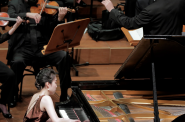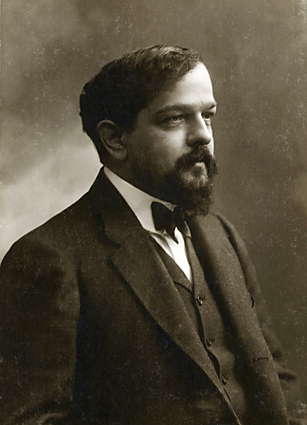Off the Beaten Path
Philomusica Quartet performs Debussy, Tchaikovsky and Part, who rarely wrote quartets.
The Philomusica Quartet closes its 2017-18 series on Monday evening with a concert by distinguished composers who rarely wrote for string quartets.
The Quartet (violinists Jeanyi Kim and Alexander Mandl, violist Nathan Hackett and cellist Adrien Zitoun) began as friends seeking to explore the literature for string quartet together. They will complete their 10th season with this concert.
The Philomusica sets the scene with a timeless, sacred work. Arvo Pärt‘s Summa clearly demonstrates his reputation as a ‘sacred minimalist.’ His works reduce sounds to the minimum required, an effort he felt allowed a more spiritual connection with the music. Summa was written for chorus. The text begins:
Credo in unum Deum, Patrem omnipotentem,
factorem cæli et terræ, visibilium omnium et invisibilium.(I believe in one God, the Father Almighty,
maker of heaven and earth, of all things visible and invisible.)
It then continues the Latin Credo in a simple statement of faith. Pärt adapted the work for several settings.
His version of the music for string quartet strips the basic material to an even rawer form, but the (unspoken) words of the Credo underlie the music’s structure. As Mandl notes: “Free metric pulses, like a Gregorian chant, observe the syllabic structure of the text.”
A reviewer for Stringendo magazine comments “The great simplicity of the piece masks its complexity. The underlying rules ensure that on the surface a cycle of continuous change is created while the deep structure possesses an order of stillness.”
The second composer on the program, Pyotr Illich Tchaikovsky, wrote only three string quartets. His String Quartet No. 3 in E-flat minor, Opus 30 has been the least performed. The quartet is an elegaic tribute to the violinist Ferdinand Laub and was premiered at the conservatory directed by Tchaikovsky’s friend, Nikolai Rubinstein. The choice of E-flat minor mutes the presentation; as Mandl explains “the number of flats, which are not a part of the vibrant overtone series for the violin string, produce a more introspective sound.” This effect fits the slow movement, marked “Andante funebre e dolorous,” particularly well.
In this quartet, Tchaikovsky depends less on memorable melodies, paying more attention to motivic rhythms, although Mandl identifies fragments from the composer’s symphonic works in the first movement.
The third composer on the program, Claude Debussy, wrote his breakthrough, impressionistic String Quartet in G minor, op. 10 in 1893. A germinal motif introduced in the first movement appears as a thread throughout the quartet. A delightful scherzo features a viola variation of the motif surrounded by pizzicato accompaniment. Melodic themes build dramatically in the third movement. The quartet concludes with rhythmic echoes of the opening motif.
Debussy’s string quartet breaks substantially with past formal structures. Critic Keith Anderson observes that “Debussy never bothered with formal development, bold ideas just rise out so naturally against the background when their time comes. ” Mandl observes that the parts may be as important as the sum. He seeks a balance between the pentatonic theme woven into every movement and the changing colors and textures in between. “There is a tendency to play the quartet too fast. Debussy offers subtle shadings. We provide the listener with a magnifying glass. Pushing does not allow enough time for the listener to savor what is going on.”
The Quartet’s interpretation of the Debussy benefits from the experience of cellist Zitoun, a product of the Conservatoire de Paris. All of the Philomusica Quartet’s performances are enhanced by spirited discussion among members of the quartet as they seek solutions to the challenges each composer presents.
Monday’s April 23rd concert begins at 7:30 p.m. at Wisconsin Lutheran College’s Schwann Concert Hall – located at 8815 W. Wisconsin Ave., Milwaukee. General admission tickets ($25) may be purchased at the door or in advance through the Wisconsin Lutheran College box office web site nor at 414-443-8802. Student tickets are available for $12. A three story parking garage just east of Schwann Concert Hall offers free parking.
On Sunday, May 6th at 4:00 p.m. the Philomusica’s will play a special concert at the Jewish Community Center on 6255 N. Santa Monica Blvd. in Whitefish Bay. Milwaukee Symphony Orchestra Associate Conductor Yaniv Dinur will join the quartet for a Antonín Dvořák’s Piano Quintet No. 2 in A major, Opus 81, reprising a dramatic performance in the regular series on February 6th.
Preview
-
PianoArts Festival Features Rising Stars
 May 28th, 2024 by Michael Barndt
May 28th, 2024 by Michael Barndt
-
Four Nations Ensemble Goes For Baroque
 May 13th, 2024 by Michael Barndt
May 13th, 2024 by Michael Barndt
-
Mozart on Prospect Avenue
 May 9th, 2024 by Martha Brown
May 9th, 2024 by Martha Brown





















